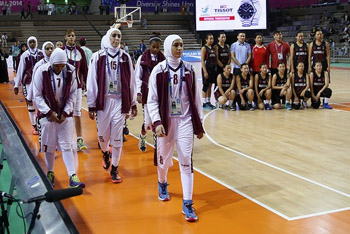Incheon, Sep 26: The Qatari women's basketball team withdrew from the Asian Games in protest against international rules that ban players from wearing Muslim headscarves in competition.
 The dispute over the Qatari players' refusal to remove their hijabs - regarded by some as a rule that discriminates against Muslim women - has created a stir at the games and raised new questions about rules banning head coverings.
The dispute over the Qatari players' refusal to remove their hijabs - regarded by some as a rule that discriminates against Muslim women - has created a stir at the games and raised new questions about rules banning head coverings.
Qatar delegation leader Khalid al-Jabir said the team decided to withdraw and already was preparing to return home.
The Qatari women were to play Nepal on Thursday afternoon but did not show at the venue. Officials took their places, starting lineups were distributed to the media and announced to the spectators, but none of the Qatari players arrived. The women were not allowed to wear head coverings in their opening game on Wednesday and refused to play, surrendering the game to Mongolia.
FIBA, international basketball's ruling body, said in a statement Thursday it "regrets that a delegation was sent to the Asian Games with uniforms that do not conform to the official basketball rules." FIBA added the delegation should have been aware of the rules and how to communicate with officials concerning "uniforms or any other regulatory matter related to the event."
The Olympic Council of Asia and the Asian Games organizing committee had no immediate comment.
Organizers, who have tried to portray the regional Olympic-style event as a showcase of diversity, seemed surprised by the players' decision to not show at all Thursday.
"We did not get any intimation from the Qatar team on whether they'll come for the match or not," technical delegate Heros Avanesian said. "We had no option but to wait for them before awarding the match to the other team."
Al-Jabir said the team had been left with no choice.
"We're not forfeiting games - we're not being allowed to play," al-Jabir said by phone hours before the Nepal game. "On the one hand, everyone wants more women to participate in these games and, on the other hand, they're discouraging Muslim women who want to play in hijab."
Although sports ranging from bowling to badminton allow hijabs to be worn during Asian Games competition, basketball's world governing body does not allow them in international competition. The issue reached an impasse when the Qatari women forced the issue by refusing to play without their hijabs against Mongolia.
Asian Games officials on Wednesday said they did not receive any instructions from FIBA to allow head coverings, and were simply following the rules which restrict the use of headgear, hair accessories, and jewelry when they awarded the result to Mongolia.
Such restrictions were initially designed for the safety of players, but have recently been challenged on cultural and religious grounds.
Regulations about head coverings in basketball came into focus this year when two male Sikh players from India were told to remove their turbans during the Asia Cup in July in China.
Earlier this month, FIBA said it was launching a two-year trial phase allowing some players to wear head coverings. But the Swiss-based FIBA issued a clarifying statement saying it "allows exceptions to be applied only at the national level and the Asian Games is an international event."
FIBA will evaluate the rule again next year and determine whether to allow head coverings at some level of international competition from next summer. A full review in 2016 will decide if it will become a permanent rule change after the 2016 Olympics.
In Doha, Qataris interviewed by The Associated Press said the players should have been allowed to compete while wearing the hijab.
"The girls already have a lot of social pressures," said bank employee Faisal Salman. "Their determination to play basketball or football should be supported and encouraged by the authorities and sports bodies. Instead (they are) preventing them and discriminating against them."





Comments
Add new comment